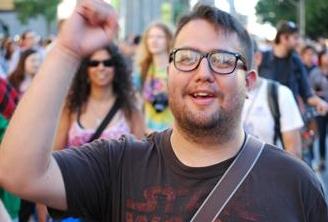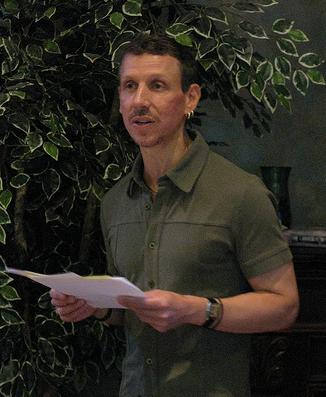
Casey Oraa is Queer Ontario's vice-chair.
Activist advocacy group Queer Ontario held its first annual general meeting on Nov 5, at which it elected a new steering committee and created a formal governance policy.
The steering committee includes founder Nick Mulé as chair, Casey Oraa as vice-chair, Richard Hudler as treasurer, and Martin Otarola as secretary, alongside members-at-large Lisa Duke and Davina Hader.
The group, a hip social-media-savvy offspring of the now-dissolved Coalition for Lesbian and Gay Rights in Ontario, focuses on internet resources, social media advocacy, and traditional educational and lobbying tactics to promote queer rights in the political and public spheres.
Among other activities this year, members advocated for Catholic students fighting for gay-straight alliances and prepared voter information about queer issues during the Ontario election.
Queer Ontario also spoke out to the Independent Civilian Review into Matters Relating to the G20 Summit about the treatment of queer detainees by police during the G20 protests.
Its first AGM was meant to recap the year’s activities, approve new policy around membership, and elect new leadership.
Trans activist and new Pride Toronto board member Susan Gapka said she was impressed by how well women were represented on this year’s committee. “I was pleasantly surprised that three of the nominations from the floor were women, and two of them were elected,” she says.
Gapka hopes, however, this won’t be an electoral fluke for the mostly male steering committee. “I kind of think it’s really important that there are mechanisms in place for gender equity or gender parity.”
Mulé also wants to push for more diversity in the group. “We are overwhelmingly a white, middle class, gay male organization with smatterings of diversity,” he said in a report. “That most definitely needs to be expanded upon if we are to truly take up the multivariate issues of our communities.”
The relatively new activist group — founded in 2009 — has in two years moved from informal, consensus-based operation to a more structured governance policy, Otárola says.
He is conflicted about the effect a formal policy could have on the group’s mandate.
A year and a half ago, when he first got involved, “it was a different dynamic.” Now, he says, “we’re basically copying the formats of more conservative organizations.”
Oraa is the newly elected vice-chair of Queer Ontario. “I’m of two minds with this,” he said. “On one hand, I appreciate a sort of semi-rigid or rigid structure in getting things done . . . Often, a big part of activist work . . . is responding and reacting.”
At the same time, he says, “we’re not trying to disempower our members.”
The new bylaws, including a formalized discipline and removal process for members who break the rules, passed with a few proposed amendments. Oraa hopes a formal discipline policy will keep people accountable.
“Our leading queer and trans activists have rigid hierarchies that kind of disenfranchise the very communities they’re supposed to represent,” he says. “We want to avoid that as much as possible.”
Queer Ontario will hold its next general meeting on Nov 16 at the 519 Church St Community Centre. Organizers say all are welcome to share ideas and get involved.


 Why you can trust Xtra
Why you can trust Xtra


